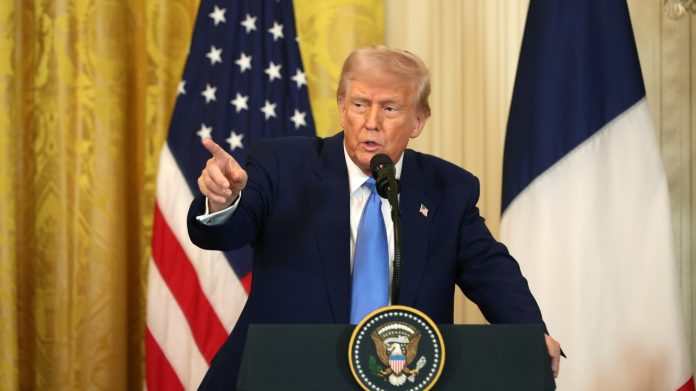President Trump delivers remarks during a joint news conference in the East Room at the White House on Feb. 24.
Tasos Katopodis/Getty Images
hide caption
toggle caption
Tasos Katopodis/Getty Images
Federal agencies were split on whether employees should comply with Elon Musk’s directive to list five accomplishments in the past week, sowing more confusion as the midnight deadline for responding loomed, according to emails seen by NPR, and as the agency overseeing the request appeared to issue conflicting guidance Monday.
Over the weekend, officials at the departments of Defense, State, Homeland Security and Energy told workers not to respond to the government-wide “What did you do last week?” email sent by the Office of Personnel Management (OPM) on Saturday. At the Department of Homeland Security, that contradicted earlier guidance from leaders at the Cybersecurity and Infrastructure Security Agency and the Federal Emergency Management Agency, which are both housed within DHS.

Department of Health and Human Services (HHS) staff were initially told to reply but then received a Sunday evening email asking them to “pause” responses pending additional guidance. Late Monday, a third email told employees, “There is no HHS expectation that HHS employees respond to OPM and there is no impact to your employment with the agency if you choose not to respond.”
For those who chose to respond, the department advised them not to name other HHS employees they worked with, matters they are working on or specific grants or contracts. “Assume that what you write will be read by malign foreign actors and tailor your response accordingly,” the email warned.
Meanwhile, agencies including the departments of the Treasury, Veterans Affairs, Commerce and Interior instructed their employees to respond, with a range of instructions on how to do so, while also reminding them not to share classified information.
The internal emails were shared with NPR by current and former government employees who wanted to remain anonymous because they fear retaliation by the Trump administration and in some cases are still working at agencies where they are not authorized to share information.
By late Monday afternoon, OPM updated its instructions for agencies, according to messages circulated at HHS and the Equal Employment Opportunity Commission (EEOC). In a memo obtained by NPR, EEOC said that OPM told agencies to communicate to staff that “any employee response to the email is voluntary” and that “not responding will not be considered a resignation.”
But in a guidance note released publicly by OPM later Monday, Charles Ezell, the agency’s acting director, did not say a response to the email was voluntary. Instead, Ezell wrote only that “[a]gencies should review responses and evaluate nonresponses,” and that agency leaders “may exclude personnel from this expectation at their discretion.”
He added that “agencies should consider any appropriate actions regarding employees who fail to respond to activity/accomplishment requests. It is agency leadership’s decision as to what actions are taken.”




